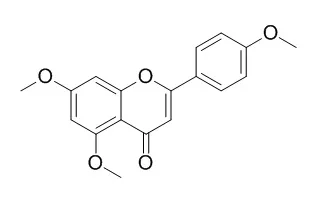Natural Products

- ChemFaces is a professional high-purity natural products manufacturer.
- Product Intended Use
- 1. Reference standards
- 2. Pharmacological research
- 3. Inhibitors




| Size /Price /Stock | 10 mM * 1 mL in DMSO / $25.1 / In-stock | Other Packaging | *Packaging according to customer requirements(100uL/well, 200uL/well and more), and Container use Storage Tube With Screw Cap |

| Size /Price /Stock | 10 mM * 100 uL in DMSO / Inquiry / In-stock 10 mM * 1 mL in DMSO / Inquiry / In-stock | Related Libraries |
| Description: | Trimethyapigenin has anti-inflammatory activity, it can moderately inhibit production of TNF-α. ,iNOS mRNA and iNOS protein in a dose-dependent manner. It may be a potential candidate for anti-atrial fibrillation, it can significantly inhibit the atrial potassium currents hKv1.5/I(Kur) and I(KACh). | |||
| Targets: | Potassium Channel | AChR | TNF-α | NO | NOS | ERK | JNK | IkB | MAPK | IKK | |||
| In vitro: |
|
| Source: | The roots of Scutellaria indica L. |
| Solvent: | Chloroform, Dichloromethane, Ethyl Acetate, DMSO, Acetone, etc. |
| Storage: | Providing storage is as stated on the product vial and the vial is kept tightly sealed, the product can be stored for up to 24 months(2-8C). Wherever possible, you should prepare and use solutions on the same day. However, if you need to make up stock solutions in advance, we recommend that you store the solution as aliquots in tightly sealed vials at -20C. Generally, these will be useable for up to two weeks. Before use, and prior to opening the vial we recommend that you allow your product to equilibrate to room temperature for at least 1 hour. Need more advice on solubility, usage and handling? Please email to: service@chemfaces.com |
| After receiving: | The packaging of the product may have turned upside down during transportation, resulting in the natural compounds adhering to the neck or cap of the vial. take the vial out of its packaging and gently shake to let the compounds fall to the bottom of the vial. for liquid products, centrifuge at 200-500 RPM to gather the liquid at the bottom of the vial. try to avoid loss or contamination during handling. |
 Cell. 2018 Jan 11;172(1-2):249-261.e12. doi: 10.1016/j.cell.2017.12.019.IF=36.216(2019)
Cell. 2018 Jan 11;172(1-2):249-261.e12. doi: 10.1016/j.cell.2017.12.019.IF=36.216(2019) Cell Metab. 2020 Mar 3;31(3):534-548.e5. doi: 10.1016/j.cmet.2020.01.002.IF=22.415(2019)
Cell Metab. 2020 Mar 3;31(3):534-548.e5. doi: 10.1016/j.cmet.2020.01.002.IF=22.415(2019) Mol Cell. 2017 Nov 16;68(4):673-685.e6. doi: 10.1016/j.molcel.2017.10.022.IF=14.548(2019)
Mol Cell. 2017 Nov 16;68(4):673-685.e6. doi: 10.1016/j.molcel.2017.10.022.IF=14.548(2019)| 1 mg | 5 mg | 10 mg | 20 mg | 25 mg | |
| 1 mM | 3.2018 mL | 16.0092 mL | 32.0184 mL | 64.0369 mL | 80.0461 mL |
| 5 mM | 0.6404 mL | 3.2018 mL | 6.4037 mL | 12.8074 mL | 16.0092 mL |
| 10 mM | 0.3202 mL | 1.6009 mL | 3.2018 mL | 6.4037 mL | 8.0046 mL |
| 50 mM | 0.064 mL | 0.3202 mL | 0.6404 mL | 1.2807 mL | 1.6009 mL |
| 100 mM | 0.032 mL | 0.1601 mL | 0.3202 mL | 0.6404 mL | 0.8005 mL |
| Kinase Assay: |
|